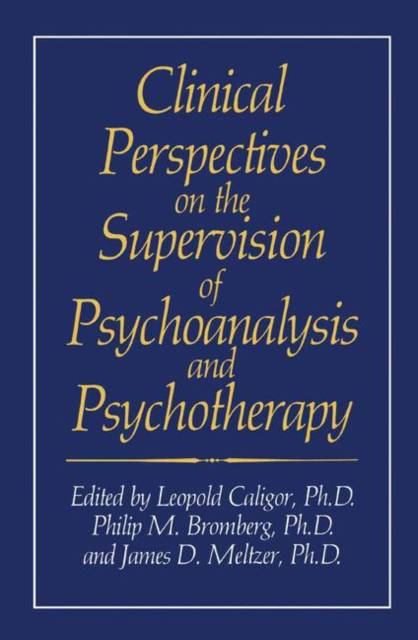
- Afhalen na 1 uur in een winkel met voorraad
- Gratis thuislevering in België vanaf € 30
- Ruim aanbod met 7 miljoen producten
- Afhalen na 1 uur in een winkel met voorraad
- Gratis thuislevering in België vanaf € 30
- Ruim aanbod met 7 miljoen producten
Zoeken
Clinical Perspectives on the Supervision of Psychoanalysis and Psychotherapy
€ 195,95
+ 391 punten
Omschrijving
In order to complete training successfuIly, every psychoanalyst has to be a supervisee. This experience leads each analyst to want to become a supervisor. Until recently, very little has been discussed about wh at supervision is, how it is done, and how it is related to the various theories of psychoanalysis that are held as articles of faith. The 1980-1981 program of the William Alanson White Psychoanaly- tic Society was devoted to supervision-with representatives of various "schools" demonstrating their ways of doing consultations with ana- lysts about patients. This book is an extension of that endeavor. In it, supervisors of various persuasions discuss this topic. The editors-Leopold Caligor, Philip M. Bromberg, and James D. Meltzer-are to be congratulated for the high level of discourse repre- sented by the various chapters. They are to be commended as weIl about the eloquent statement this book makes-namely, there are many an- swers and approaches and no final answer to the questions raised by the volume.
Specificaties
Betrokkenen
- Uitgeverij:
Inhoud
- Aantal bladzijden:
- 282
- Taal:
- Engels
- Reeks:
Eigenschappen
- Productcode (EAN):
- 9781489936554
- Verschijningsdatum:
- 27/09/2013
- Uitvoering:
- Paperback
- Formaat:
- Trade paperback (VS)
- Afmetingen:
- 156 mm x 234 mm
- Gewicht:
- 426 g

Alleen bij Standaard Boekhandel
+ 391 punten op je klantenkaart van Standaard Boekhandel
Beoordelingen
We publiceren alleen reviews die voldoen aan de voorwaarden voor reviews. Bekijk onze voorwaarden voor reviews.










